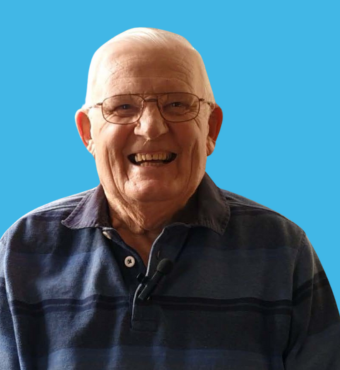
Derek 89 is taking part in the Prepare for Kidney Care research study. He shares with us his experience with us and why he thinks it is important for people to be involved in research.
Derek has been married to Gwen for 67 years. They have three children, six grandchildren and seven great grandchildren.
I’d already taken part in a three-year research program
So, when I was approached to take part in the Prepare for Kidney Care study, I had no hesitation in saying yes.
In the earlier stages of my kidney disease, I first had an interview about dialysis at Cossham Hospital, and I decided that on the information given at the time, that conservative care might be the best option for me, as all I needed to do was fill-out some forms every three months and a nurse visiting me at home once per year. I was doing quite well with the rest of my health issues, and my doctor joked that I might get something else before my kidneys fail. But that's not the case now.
I had a change of heart about my treatment plan
Last year, I decided to take the option of going for dialysis on the Prepare for Kidney Care Trial, as I now have a very low kidney function and I’d had a stroke. My wife was diagnosed with congestive heart failure and this year she was diagnosed with dementia.
So, I thought dialysis was the best option for me. It is going very well really. I am at Southmead in the Renal Dialysis Unit. The only downside is getting out so early in the morning. However, I go for dialysis for four hours twice a week. I find the staff very nice. They look after me and I've got no issues with that all.
It's important to be asked about research
I think it's important for people to be asked if they would like to take part in research because, at the end of the day they might discover medicines or procedures that are going to help everybody. If you are well enough and able to attend these sessions, go for it, because I believe it should be done. Because otherwise doctors, the universities can't do the actual procedures that they want to do without having people taking part in research.
Video Transcript
Hello, I'm Derek. I'm 89 years of age, I've been married to Gwen for 67 years. We have three children, six grandchildren and seven great grandchildren. I was in a previous three year research program and I ended that about three months ago and then Dr Galliford spoke to me about this project and if I'd be interested in taking on. I said well indeed.
Originally, it was all based upon Karen coming here to the house once a year and me filling in forms every three months. So, it was a lot better for me because I didn't have to travel into Southmead every three months for hospital appointments.
Change of Heart from Conservative Management to Dialysis
I first had an interview about dialysis when I was stage four, at Cossham Hospital and I decided on the information that was given at the time, that conservative care might be the best option for me.
I was doing quite well with the rest of my health issues, and Dr Gallagher jokingly said, you might get something else to get you before your kidneys fail. But that's not the case. That's reversed now.
Last year, I decided to take the option of going for dialysis because, I now have a very low function and I had a stroke. My wife was diagnosed with congestive heart failure. This year she has also been diagnosed with dementia.
So, I thought dialysis was the best option for me. It is going very well really. I am at Southmead at the moment in the Renal Dialysis Unit. The only downside is getting out so early in the morning. However, I go for dialysis for four hours twice a week. I find the staff very nice. They look after me and I've got no issues with that all.
It's important to be asked about research
I think it's important for people to be asked if they would like to take part in research because, at the end of the day they might discover medicines or procedures that are going to help everybody. If you are well enough and able to attend these sessions, go for it, because I believe it should be done. Because otherwise doctors, the universities can't do the actual procedures that they want to do without having people taking part in research.
